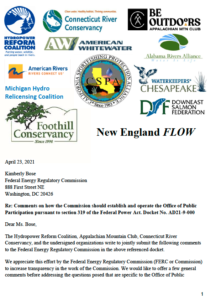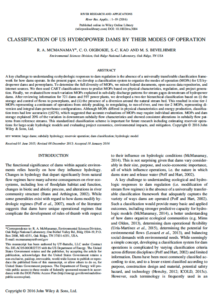Here We Go Again – FERC Rapidly Issuing Waivers on Water Quality Certifications for California Dams
By Cindy Charles
The Federal Energy Regulatory Commission (FERC) continues to roll out waivers for water quality certifications for dam relicensings in California at an alarming rate. On June 22, CSPA and allies in the Foothills Water Network[1] (Network) filed another Request for Rehearing on an “Order on Waiver of Water Quality Certification”. The order was issued in the relicensing of Yuba County Water Agency’s (YCWA) Yuba River Development Project (Project). The Project occupies waters in the Yuba River watershed.
The Order says that the California State Water Resources Control Board (State Water Board) waived its authority under section 401 of the Clean Water Act (CWA) to issue water quality certification for the relicensing of the Project. This finding is once again based on the Commission’s recently adopted interpretation of the one-year deadline for a state to act on a request for water quality certification under CWA section 401.[2] This interpretation reverses the Commission’s longstanding position that an applicant’s withdrawal-and-resubmittal of a request triggers a new one-year period for the State to act. Whenever implemented, the Commission’s new interpretation of waiver will prevent states from placing conditions in hydropower licenses to protect water quality. FERC licenses last 30 to 50 years.
Prior to June 18th, FERC had issued waivers for the Placer County Water Agency’s Middle Fork American River Project, Southern California Edison’s Big Creek system, PG&E’s Kilarc-Cow Creek Project, and Nevada Irrigation District’s Yuba-Bear Project. On June 18th, FERC issued waivers for Merced Irrigation District’s Merced River and Merced Falls projects and for South Feather Water and Power Agency’s South Feather Project. This brings to seven the number of FERC orders waiving Section 401 certification in California since the Hoopa Valley decision in January 2019.
In the Rehearing Request for the YCWA project, the Network argues that YCWA, not the State Water Board, has delayed certification. YCWA committed to act as lead agency under the California Environmental Quality Act (CEQA) for preparing the environmental document required to support the State Water Board’s certification. In the three years since it filed its first 401 request, YCWA did not begin, let alone complete, the CEQA process. YCWA argued that the State Water Board should bear the consequences for YCWA’s failure to prepare the CEQA document, and FERC agreed.
The Rehearing Request argues that waiver is not warranted because, unlike the Hoopa Valley decision, there was no written agreement between YCWA and the State Board to not process a 401 certification request. The record does not show the State Water Board was unwilling to act on YCWA’s 401 request once YCWA submitted the CEQA document that was a prerequisite to the State Water Board’s action.
Further, the license is not ready for final decision. FERC staff’s own delay in preparing a biological assessment to inform the required Endangered Species Act consultation for the Project has delayed consultation with the National Marine Fisheries Service regarding the Project’s potential adverse effects on federally-listed spring-run Chinook salmon, steelhead, and green sturgeon. Thus, the certification process by the State Board for the Project has not contributed to actual delay in the relicensing proceeding.
The Network requests that FERC reverse its determination that the State Water Board waived its 401 authority in this relicensing and direct YCWA to complete the CEQA document that is necessary for the Water Board to act on a certification request. Further, the Network requests that FERC direct YCWA to submit a new request for water quality certification within 30 days of YCWA’s certification of the final CEQA document.
[1] The Foothills Network is comprised of American Rivers, American Whitewater, California Outdoors,California Sportfishing Protection Alliance, Friends of the River, Gold Country Fly Fishers, Northern California Council of Fly Fishers International, Sierra Club Mother Lode Chapter, South Yuba River Citizens League, and Trout Unlimited.
[2] Interpretation relies on the U.S. Court of Appeals for the D.C. Circuit’s (D.C. Circuit) decision in Hoopa Valley Tribe v. Federal Energy Regulatory Commission (Hoopa Valley) issued January 2019.


